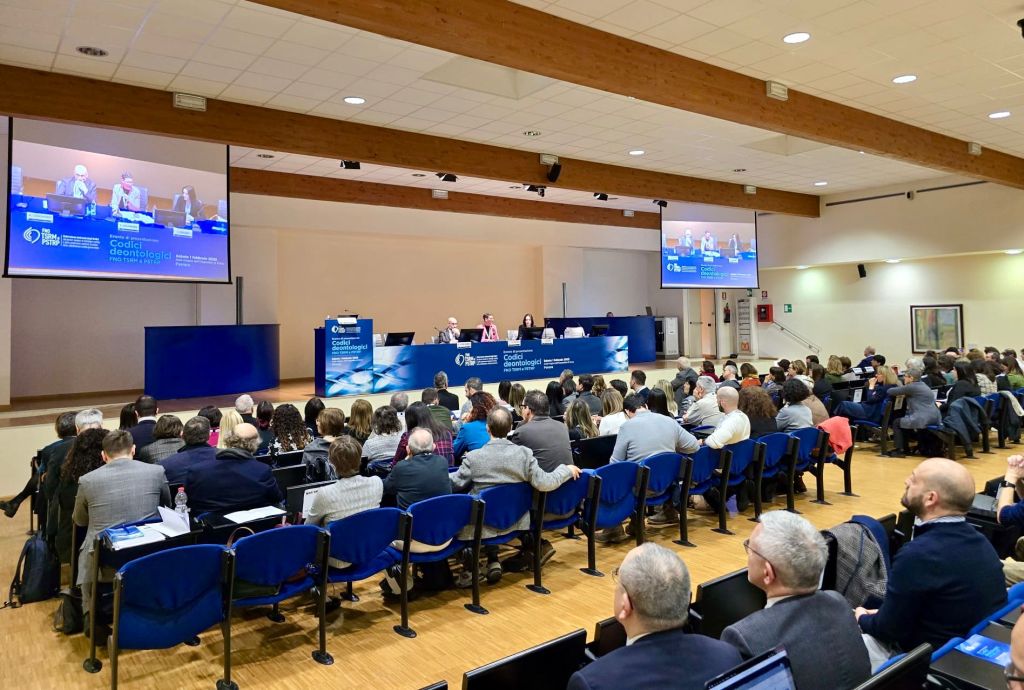FERRARA (ITALPRESS) – Ensuring the health of people and communities by promoting transparency about the duties and identity of health care professionals is the intent of the new Codes of Ethics of the health professions afferent to the National Federation of Orders of Technical, Rehabilitation and Prevention Health Professions (FNO TSRM and PSTRP), presented today at the Arcispedale “Sant’Anna” in Cona, Ferrara. The new regulations govern the behavior of more than one hundred thousand professionals belonging to 16 health professions: Health Care Assistants, Dietitians, Dental Hygienists, Speech Therapists, Orthoptists, Audiometric Technicians, Hearing Aid Technicians, Prevention Technicians in the Environment and Workplace, Psychiatric Rehabilitation Technicians, Cardiocirculatory pathophysiology and cardiovascular perfusion technicians, Neurophysiopathology technicians, Orthopedic technicians, Biomedical laboratory health technicians, Medical radiology health technicians, Developmental neuro and psychomotor therapists and Occupational therapists.”Our Codes of Ethics remind us that we are part of something bigger: a network of skills, values and responsibilities that are interwoven to ensure the well-being and health of people,” says Teresa Calandra, FNO TSRM and PSTRP President, “for each of us they represent a constant invitation to do more, to always act with awareness, respect and humanity.”The revision of the Codes of Ethics, the result of an open dialogue and the active participation of professionals, entities and citizens, testifies to a modern and inclusive approach to defining the responsibilities and rights of those who work in the health sector. It is a valuable contribution to strengthening the relationship of trust with people and promoting a professional practice that fully responds to the needs of a society in constant transformation,” these were the words of Health Minister Orazio Schillaci in his message of greeting and appreciation to President Calandra.Approved during the last FNO National Council PTSRM and PSTRP, held yesterday in the Este city, the Deontological Codes are the result of an extraordinary revision activity, which lasted four years and was conducted by a working group, coordinated by Antonio Cerchiaro, Component of the Central Committee of the National Federation, with delegation to ethics and deontology. The revision process involved more than 45 experts, including representatives of the national and territorial register commissions of the professions concerned, lawyers and ethics experts. “What has been achieved is the result of an ongoing discussion with all stakeholders, supported by the work of experts and insiders,” Cerchiaro emphasizes. “In recent years we have sifted, analyzed and evaluated an enormous amount of proposals. Our goal was to create 16 mutually consistent documents, but without neglecting the uniqueness of each profession.” Don Massimo Angelelli, Bioethicist; Daniele Rodriguez, Medical Examiner; Attorneys Fabrizio Mastro and Marco Croce; Anna Chiara Bassan, Linguist; and Massimo Burgio, who oversaw the revision activities, contributed their expertise to the creation of the Deontological Codes. The Codes of Ethics were drafted by adopting a clear and accessible linguistic register, seeking to ensure content free of interpretive ambiguity. Structured in two sections, they devote the first part to “Fundamental Principles,” consisting of 48 articles common to all professions, inspired by the ethical values recognized by the National Federation’s charter of values. At the center are the person cared for, professional responsibility and current issues such as digital health care and artificial intelligence. The second part of the document brings together the specific behavioral rules for each professional, introducing important new features. These include digital medicine, safety of care, organ and tissue donation, and the topic of humanitarian missions, as well as two major articles: one dedicated to gender medicine, which reinforces the centrality of the assisted person by taking into account differences related to sex and gender, and another on fair compensation, in accordance with Law No. 49 of 2023, which guarantees fair compensation proportionate to the service performed by the professional.To make the revision of the codes of ethics a truly participatory and inclusive process, a public consultation was launched; the initiative gathered more than 600 contributions from members of the TSRM and PSTRP Orders, Technical and Scientific Associations, Public Bodies, Citizens’ and Assisted Persons’ Associations, rights protection organizations, experts in ethics, law, ethics, and linguistics, as well as from citizens and assisted persons. All the contributions received were carefully analyzed and taken up by the working groups.Lara Salani, President of the TSRM and PSTRP Order of Ferrara, said that “as Orders we have the task of disseminating the Codes of Ethics among today’s and tomorrow’s health care professionals, making them accessible also within our degree courses. The new standards of conduct presented today represent a meeting point between caregivers and patients, a true pact of trust with citizens.” The presentation event at Sant’Anna in Ferrara was attended by representatives of the national federations of health and social-health professions, and local and regional institutions, among others. The day ended with the screening of a video, in which each of the representatives of the 16 health professions recalled one of the articles of their respective Code, to underscore its value and identity.Guarantors of quality, dignity and professional autonomy, the Codes of Ethics, do not represent static documents, but “dynamic tools, designed to grow and adapt to future changes. For the FNO TSRM and PSTRP health professions, this represents only the first stage of a path in constant transformation,” Cerchiaro concludes.The Codes can be viewed on the official website of the National Federation by clicking here, https://www.tsrm-pstrp.org/wp-content/uploads/2025/01/CodiciDeontologici_DEF_collegamento.pdfIl video of the 16 health professions can be viewed at: https://www.youtube.com/watch?v=s4SEZXYgews
– FNO TSRM and PSTRP press office photo -(ITALPRESS).

